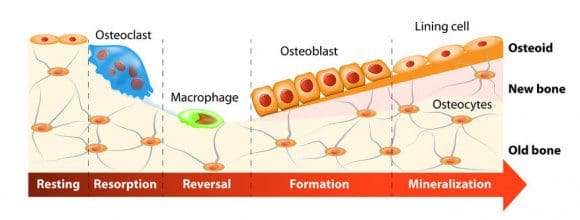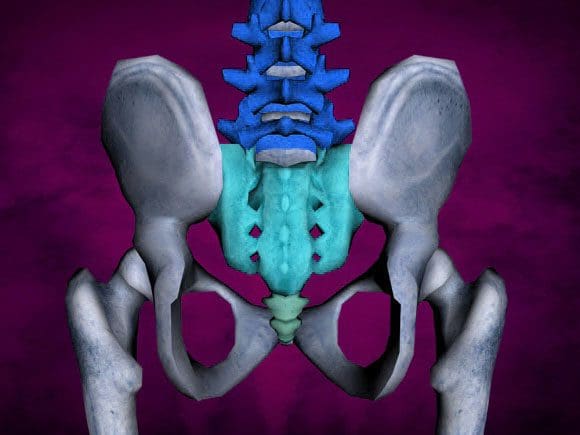Paget’s disease, aka osteitis deformans, is the second most common bone disorder in the United States, right behind osteoporosis. Paget’s disease happens when bone cells don’t function properly and result in:
- Deformed
- Enlarged
- Fragile bones
The bones of the spine (vertebrae) are susceptible to this condition.
Table of Contents
Paget’s Disease and The Spine
Paget’s disease begins with two bone cell types malfunctioning: osteoblasts and osteoclasts. Bones constantly undergo a regenerative process where osteoclasts break down old bone, and osteoblasts build new bone. The bones stay strong when the cells work together in a balanced way.

With Paget’s disease, the osteoclasts break down old bone faster than normal. This forces osteoblasts to work harder and longer. When this happens, the new bone is placed improperly, leading to deformity. The newly built bone tends to be more fragile than healthy bone and has a greater risk of fracturing. Paget’s most commonly affects the spinal bones, specifically the:
- Low back
- Sacrum
- Pelvis
Paget’s disease can involve a single bone meaning it is monostotic or multiple bones or polyostotic. Monostotic cases make up about 10- to 35 percent of total occurrences.

Paget’s typically affects people over 55, and 3% of that population develops the disease.
Spinal Symptoms
Many have Paget’s in their spine but don’t know it. The most common symptom is bone pain in the neck and/or back. The pain can feel:
- Dull
- Persistent
- Worse at night
It can cause spinal cord compression and neurologic symptoms like:
- Tingling
- Numbness
- Difficulty walking
- Bowel
- Bladder problems
Causes
The cause of Paget’s disease is still unknown, but research scientists believe genetics and viral infection contribute to the condition.
Spine-Related Complications
The telltale of Paget’s is the bone deformities that can result in painful spine conditions, which include:
- Spinal stenosis
- Kyphosis
The disease makes the spine prone to fractures because of the weakened new bone. Also, vertebral body compression fractures can occur and cause spinal cord compression and nerve pain. Types of spinal arthritis that can coexist with Paget’s include:
- Rheumatoid arthritis
- Spondylosis or spinal osteoarthritis
- Ankylosing spondylitis
It has also been linked to spinal tumors that include osteosarcoma.
Diagnosing and Treatment
If symptoms are obvious, like hunchback brought on from kyphosis, then a physical exam could help determine the diagnosis.
Most cases require imaging tests to get a closer look at the bones.
- A doctor/chiropractor may order a spine x-ray to confirm a diagnosis and illuminate bone problems.
- For early stages, a bone scan will pick up initial deformities better than an x-ray.
- CT scans or magnetic resonance imaging (MRI) can also be used.
Blood testing can be important in the diagnosis
Known as a bone-specific alkaline phosphatase test, it can detect when bones regenerate too fast. It’s not only used during diagnosis but also during treatment in helping to monitor patients as they go through the therapy. It is treated with medications called bisphosphonates. These medications help return normal function to the osteoclasts and osteoblasts. Bisphosphonates can manage the disease and reduce symptoms but do not cure the disease.
Living with Paget’s
Advanced cases can cause spine problems, which include spinal fractures. Most with Paget’s disease have preferable outcomes. When Paget’s disease is managed with medication, regular doctor visits, chiropractic care, and proper diet, achieving a healthy quality of life shouldn’t be a problem.
Chiropractor Low Back Pain Relief
David Garcia, a maintenance facility worker, and a proud Dad in El Paso, TX, at the Region 19 Education Services Center. However, his chronic lower back pain often influences Mr. Garcia’s everyday life. After undergoing worsening symptoms for some time, Mr. Garcia was recommended to seek chiropractic care with Dr. Alex Jimenez by his sister, a former patient of Dr. Jimenez. Mr. Garcia has since experienced enormous relief from his lower back pain, and he’s grateful to Dr. Jimenez and his staff for supplying him with education regarding his health problems as well as properly caring for him. Mr. Garcia recommends Dr. Jimenez as the non-invasive surgical selection for lower back pain.
NCBI Resources
Several studies show that chiropractic care is a very effective treatment for back pain. The chiropractor will perform spinal manipulation to bring the spine (and body) into proper alignment. He may also offer advice on exercises, stretching, and ways to improve posture and recommend lifestyle changes and what to look for in supportive shoes. Chiropractic’s whole-body approach not only helps relieve back pain, but it also helps prevent it as well.
This allows the patient to gain whole-body benefits from chiropractic.
- Improved mental clarity and cognitive function.
- A healthier posture.
- Improved quality of sleep.
- Stronger immune system.
- Fewer migraines and headaches.
- A healthier spine.
Post Disclaimer
Professional Scope of Practice *
The information on this blog site is not intended to replace a one-on-one relationship with a qualified healthcare professional or licensed physician and is not medical advice. We encourage you to make healthcare decisions based on your research and partnership with a qualified healthcare professional.
Blog Information & Scope Discussions
Welcome to El Paso's Premier Wellness and Injury Care Clinic & Wellness Blog, where Dr. Alex Jimenez, DC, FNP-C, a board-certified Family Practice Nurse Practitioner (FNP-BC) and Chiropractor (DC), presents insights on how our team is dedicated to holistic healing and personalized care. Our practice aligns with evidence-based treatment protocols inspired by integrative medicine principles, similar to those found on this site and our family practice-based chiromed.com site, focusing on restoring health naturally for patients of all ages.
Our areas of chiropractic practice include Wellness & Nutrition, Chronic Pain, Personal Injury, Auto Accident Care, Work Injuries, Back Injury, Low Back Pain, Neck Pain, Migraine Headaches, Sports Injuries, Severe Sciatica, Scoliosis, Complex Herniated Discs, Fibromyalgia, Chronic Pain, Complex Injuries, Stress Management, Functional Medicine Treatments, and in-scope care protocols.
Our information scope is limited to chiropractic, musculoskeletal, physical medicine, wellness, contributing etiological viscerosomatic disturbances within clinical presentations, associated somato-visceral reflex clinical dynamics, subluxation complexes, sensitive health issues, and functional medicine articles, topics, and discussions.
We provide and present clinical collaboration with specialists from various disciplines. Each specialist is governed by their professional scope of practice and their jurisdiction of licensure. We use functional health & wellness protocols to treat and support care for the injuries or disorders of the musculoskeletal system.
Our videos, posts, topics, subjects, and insights cover clinical matters and issues that relate to and directly or indirectly support our clinical scope of practice.*
Our office has made a reasonable effort to provide supportive citations and has identified relevant research studies that support our posts. We provide copies of supporting research studies available to regulatory boards and the public upon request.
We understand that we cover matters that require an additional explanation of how they may assist in a particular care plan or treatment protocol; therefore, to discuss the subject matter above further, please feel free to ask Dr. Alex Jimenez, DC, APRN, FNP-BC, or contact us at 915-850-0900.
We are here to help you and your family.
Blessings
Dr. Alex Jimenez DC, MSACP, APRN, FNP-BC*, CCST, IFMCP, CFMP, ATN
email: coach@elpasofunctionalmedicine.com
Licensed as a Doctor of Chiropractic (DC) in Texas & New Mexico*
Texas DC License # TX5807
New Mexico DC License # NM-DC2182
Licensed as a Registered Nurse (RN*) in Texas & Multistate
Texas RN License # 1191402
ANCC FNP-BC: Board Certified Nurse Practitioner*
Compact Status: Multi-State License: Authorized to Practice in 40 States*
Graduate with Honors: ICHS: MSN-FNP (Family Nurse Practitioner Program)
Degree Granted. Master's in Family Practice MSN Diploma (Cum Laude)
Dr. Alex Jimenez, DC, APRN, FNP-BC*, CFMP, IFMCP, ATN, CCST
My Digital Business Card


